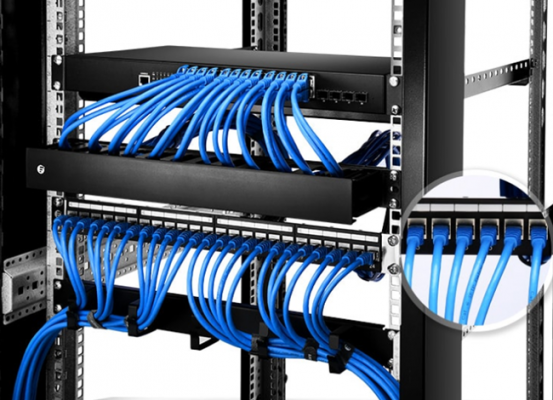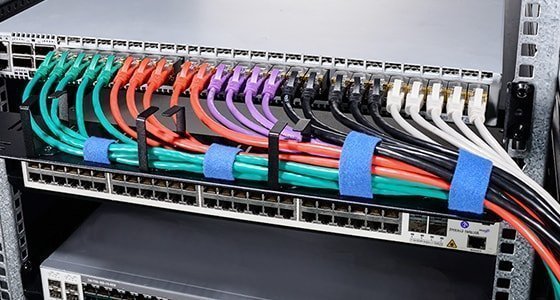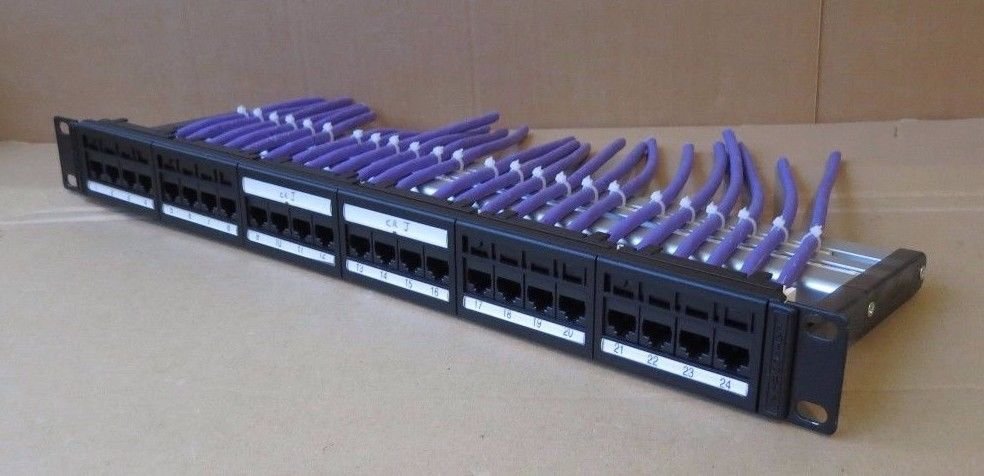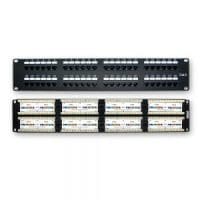Network Patch Panels Cat5e,Cat6e , Cat6
Network Patch Panels cat5e / cat6e / cat6a / cat7 for structures
A patch panel is a central termination point that offer easy array of cat5e, cat6e/a, and cat7 ports for simple, neat and easy-to-manage rj45 plug.
Each patch panel port connects to a network via a patch cable, to another port located elsewhere in a network
You can get the best patch panels prices in Kenya From TDK Structured Cabling Solutions Store based in Nairobi; We stock top brands such as Giganet, Siemon , D-Link, Easenet and Aico
Network Patch Panels
Network Patch Panels
Network Patch Panels
Digilink – Cat6 UTP 24 AWG PVC Round Patch Cord – 3M –DC6PCURJ03GYM
Network Patch Panels
Network Patch Panels
Wired networks are faster than Wireless networks
Most offices choose wired network for data intensive tasks because often fiber and copper networks will allow you to achieve speeds much closer to the promised maximum.
In office structured cabling solutions it’s important to set up a neat and wired network.

Most office networks have multiple wall ports in various rooms and locations often connected from a central location usually a data cabinet with network switches, routers or other network equipment
Also check out our publications on;
- Networking switches guide and price-list
- 2020 Routers guide and price list in Kenya
How Do Patch Panels Work?
Patch panels bundle multiple network ports together to connect incoming and outgoing lines — including those for local area networks, electronics, electrical systems and communications. When patch panels are part of a Local Area Network LAN, in most common applications they connect switches and routers to IP enabled devices such as Laptops, Desktops, IP Phones and much more.

- Patch panels are an efficient way to arrange network circuits Local Area Networks
- Patch panels are easy to install they offer simply plug and unplug the appropriate patch cords.
- Network Patch panels offer an easy way to troubleshoot network problem since they offer a single location for all your network input and output.
They’re frequently used in industries that require extensive sound LAN Infrastructure because they work well for connecting a variety of devices. And offices
Better structured cabling and Easy to manage network
The primary advantage of using patch panels, also known as patch bays, is improved organization and easier LAN network management of your wired network. Nowadays, Most patch panel manufacture designs focus on cable management.
For example, by using a front-access patch panel you can get to all your cables and terminations easily. Front-access panels work especially well in tight spaces. For businesses, patch panels are often around found in areas that house telecommunications equipment such as Network switches, PBX, POE Switches and Routers and they play a central role in network functionality.
By centralizing LAN/Ethernet / Fiber cables in one place network patch bays, patch panels make it easy for network administrators to move, add or change complex network architectures.
In well managed small office business environment, Network patch panels are the smart way to quickly transfer communications lines from office to another.
Copper and fiber patch panels.
Patch panels can be part of networks with fiber or copper/ Ethernet cabling. While fiber is much faster than copper, networking professionals disagree on whether the materials show significant performance differences in patch panels.
The primary role of the Ethernet patch panels is to direct signal traffic rather than move signal at a required speed. There’s no question, however, that fiber panels cost more.
All patch panels are subject to the same standards that provide signal and speed performance ratings for other network components.
Path panel ports and Termination slots

Ports are a component of patch panels because they provide physical entry and exit points for data. Most patch panels have either 24 or 48 ports. However, panels can include 96 ports, and some specialty versions reach 336 or more.
The number of ports on a network panel is not subject to physical limit other than the room to place them. However, panels include modules with eight ports because it’s easier to perform replacements and maintenance on smaller groupings. When a malfunction occurs, smaller groups of ports mean fewer wires to connect to a new module.
Applications of Patch Panels
If you can wire an Ethernet jack, you can wire a patch panel. You’ll simply need to repeat the sequence multiple times for your various ports.
A patch panel with eight ports should suffice for most home networks, but it’s easy to expand when you need more capacity. Panels with eight to 24 ports are readily available, and you can make use of multiple panels together to create a larger one. If you’re putting together a home or business network, can you get the job done without patch panels? Certainly, since patch panels serve more as a convenience than necessity.
But by incorporating a patch panel — or several — you can expect better cable management and easier fixes when a network component inevitably breaks down.
Also check out our Ethernet cable prices and Offers

















